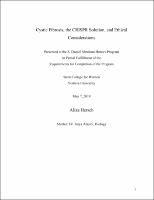Please use this identifier to cite or link to this item:
https://hdl.handle.net/20.500.12202/4477Full metadata record
| DC Field | Value | Language |
|---|---|---|
| dc.contributor.advisor | Alayev, Anya | en_US |
| dc.contributor.author | Hersch, Aliza | |
| dc.date.accessioned | 2019-07-08T18:54:26Z | |
| dc.date.available | 2019-07-08T18:54:26Z | |
| dc.date.issued | 2019-05-07 | |
| dc.identifier.citation | Hersch, Aliza | en_US |
| dc.identifier.citation | Hersch, Aliza. Cystic Fibrosis, the CRISPR Solution, and Ethical Considerations.Presented to the S. Daniel Abraham Honors Program in Partial Fulfillment of the Requirements for Completion of the Program Stern College for Women, Yeshiva University, May 7, 2019. | |
| dc.identifier.uri | https://hdl.handle.net/20.500.12202/4477 | |
| dc.identifier.uri | https://ezproxy.yu.edu/login?url=https://repository.yu.edu/handle/20.500.12202/4477 | |
| dc.description | The file is restricted for YU community access only. | en_US |
| dc.description.abstract | The world of genetics is complex and increasingly astounding as scientists continue to uncover layers of its depths. DNA, the genetic coding design, is responsible for the successful functioning of the human body. Yet a miscoding of this critical blueprint can be detrimental. Cystic Fibrosis (CF), an autosomal recessive genetic disorder, is just one example of the impact a genetic defect can have on the entire functioning of the human body. Stemming from a flaw in the Cystic Fibrosis Transmembrane Conductance Regulator gene, the mutation causes salt and water to be imbalanced in the body, resulting in thick mucus that inhibits primarily the respiratory and digestive systems. A myriad of treatment methods have been developed to downstream the effects of the disease. Medications are being researched in the area of gene therapy in an effort to successfully inject healthy genes to replace defective ones. Most recently scientists are working to correct mutations at their DNA core, through remarkable gene editing technology; the most popular of which is the CRISPR/ Cas 9 system. By cutting a DNA sequence at a specific locus, a mutation can be cut out and potentially corrected for a lifetime. Prospects are exciting while ethical concerns are daunting. But the possibility of correcting previously believed incurable genetic disorders continues to propel research and complex discussions in both the scientific and Jewish religious communities. | en_US |
| dc.description.sponsorship | S. Daniel Abraham Honors Program of Stern College for Women | en_US |
| dc.language.iso | en_US | en_US |
| dc.publisher | Stern College for Women Yeshiva University. | en_US |
| dc.rights | Attribution-NonCommercial-NoDerivs 3.0 United States | * |
| dc.rights.uri | http://creativecommons.org/licenses/by-nc-nd/3.0/us/ | * |
| dc.subject | Cystic Fibrosis | en_US |
| dc.subject | CRISPR | en_US |
| dc.subject | Recombinant Plasmid | en_US |
| dc.subject | mice and human embryos | en_US |
| dc.subject | Jewish medical ethics | en_US |
| dc.subject | senior honors thesis | en_US |
| dc.title | Cystic Fibrosis, the CRISPR Solution, and Ethical Considerations. | en_US |
| dc.type | Thesis | en_US |
| Appears in Collections: | S. Daniel Abraham Honors Student Theses | |
Files in This Item:
| File | Description | Size | Format | |
|---|---|---|---|---|
| Aliza Hersch- Thesis (PDF).pdf Restricted Access | submitted by HR/SCW | 2.9 MB | Adobe PDF |  View/Open |
This item is licensed under a Creative Commons License

